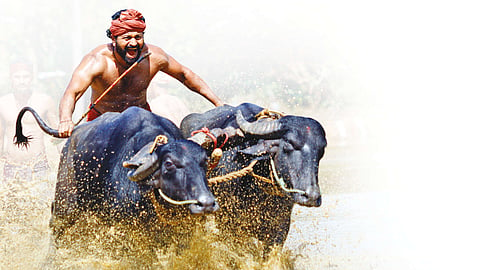

CHENNAI: Director-actor Rishab Shetty is in Chennai as Kantara is releasing in Tamil today. He not only is clad in a veshti but also asks, “Tamil pesuveengala? Appo Tamil laye pesalame, (Do you know Tamil? Let’s converse in Tamil then)”. He goes on to say, “I was the last AD to AMR Ramesh in Cyanide (2004) and Randy was the cinematographer. I was in awe of his work and spent most of my time on the sets with the cinematography team. That is when I picked Tamil. Hmmm.... say in about 27 days. Also, Bengaluru boys generally speak good Tamil,” he says with a huge smile.
Kantara that is set in three different time periods -- 1800s, 1970 and 1990 is a film that revolves around a Kambala athelete from Dakshina Kannada region has been relatable with the audience across the nation. “I hail from Kundapura, Udipi. The story takes place in my village and I have observed the rituals since I was a kid. The village seldom celebrates casteism. If there is a ritual it will be performed by people from both upper and lower castes. Why does all films have to show only the downside of casteism? There is a positive side to it as well. And that is what Kantara has focuses on. Initially, we planned to release the film in theatres in Kannada and dub across languages for OTT. Looking at the overwhelming response, we are now releasing it in theatres in all languages,” explains Rishab.
He candidly opens up that he hasn’t been able yo enjoy the success of the film yet. “I haven’t stopped yet. I have been visiting theatres and closely monitoring the responses. I haven’t been able to enjoy the success. Also, the success doesn’t mean that I will rush with my next movie. It has to be a better movie and it will take its time,” clarifies the actor-producer. Kantara released along with Mani Ratnam’s Ponniyin Selvan-1 and he says that both film thrive on their similarities. “We both have stuck to our roots. Mani sir wanted to take Chola empire’s story and the Tamil culture across the world and succeeded. I wanted to tell people about my roots and that was received well too,” he adds.
Directing and acting in a movie of such a grand scale isn’t an easy task. “The idea sparked during the second lockdown and I started shooting in last September. I had to plan things meticulously and also had to train for the buffalo fight. I took 10 minutes a day to have my lunch. To get the sets in place, I had to follow up on each and everything. The village has gone through a sea of change since 90s and it was them who helped me in getting the detailing right. In midst of all these, the budget shot up and Hombale Films had such a faith in the script that they didn’t think twice to bankroll what the script required,” Rishab recalls.
What was initially a Kannada film is now a pan-Indian sensation. “I really don’t believe in pan-Indian cinema. It is Indian cinema for me. Good content is recognised everywhere. Some day or the other the term pan-India will backfire. It is all a cycle. However, local films that are being tagged as pan-Indian movies are being profitable in regional languages,” he concludes.
Visit news.dtnext.in to explore our interactive epaper!
Download the DT Next app for more exciting features!
Click here for iOS
Click here for Android